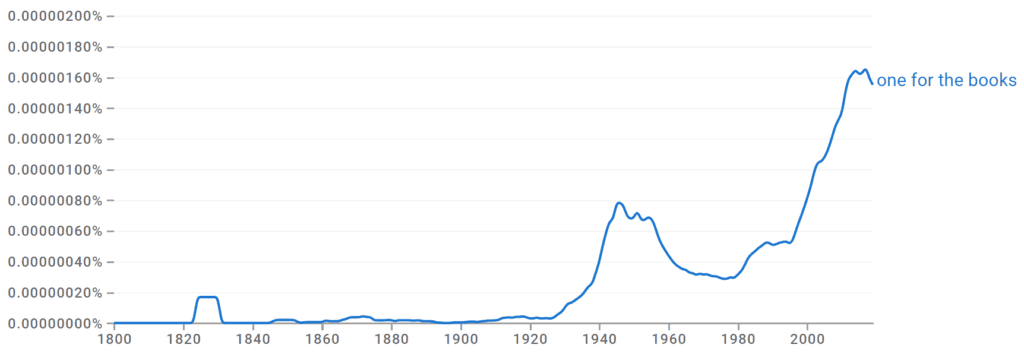The English language is full of figurative analogies called idioms that help define and clarify an author’s message. However, idioms can be confusing to English language learners or anyone unfamiliar with the term.
When something is one for the book, it means the action is something remarkable and can be used positively and negatively. Its origins can be traced back to the placing of bets on the race track. Through the years, it has changed both in wording and overall meaning to encompass a broader range of events.
Let’s learn about how this idiom came to be and what it means so you can use it in your own material.
What Does One for the Books Mean?

The idiom one for the books, also stated as another one for the books, describes something historic, memorable or remarkable. Usually, the phrase refers to something that does not occur very often and has surpassed other similar efforts or achievements.
Although it often has a positive connotation, one for the books can also be used in a negative manner to point out a rare, if undesirable, effect of behavior. People also use it humorously to highlight an unexpected but laughable result of an event or behavior.
For example:
- After slipping on the ice, the results of the three good samaritans attempting to help me and ending up on the ground were definitely one for the books. Luckily, nobody was hurt.
- Although he won the tournament fair and square, his gloating behavior was one for the books, leading to an amending rule concerning good sportsmanship.
- It had been over a decade since the high school had brought home a state title in any sport, making this particular win one for the books.
One for the Books Origin

Before the modern expression, the original literal term was “a turn-up for the book.” The information was placed in a literal notebook when bets were placed on horse races in the 18th and 19th centuries. When a horse was placed in the notebook, it meant they had “made the book” or had good odds of winning a race.
When a horse won a race that hadn’t been written down in the notebook, the person collecting the bets kept the money. This was called a “turn up” and became synonymous with a surprise or example of good fortune.
One of the earliest examples of this comes from the Leeds Intelligencer newspaper from August 1863 with a success of a horse named Blackdown:
- “A rare turn-up for the book-makers, the majority of whom had never written Blackdown’s name in their books.”
Through the last 150 years, the phrase has simplified to “one for the books” and now refers to a wider array of things that cause an unexpected surprise.
Let’s Review
Despite its origins referencing horse racing, something to be one for the books still means to be unexpected, a surprise, or memorable. It can be used positively or negatively and is often applied to behaviors or results of action that won’t soon be forgotten.
Use the idiom when you want to point out something that you feel deserves special attention.
Enjoyed reading about this idiom? Check out some others we covered:
